Comprehensive Guide to Garden Maintenance in Clapham
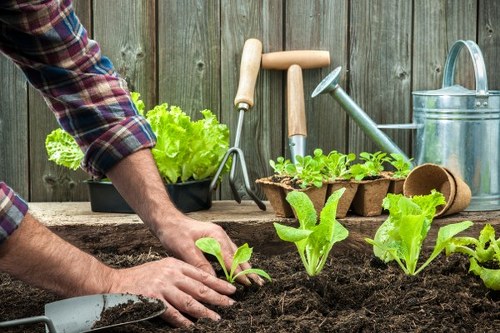
Introduction to Garden Maintenance
Maintaining a beautiful garden in **Clapham** requires dedication, knowledge, and the right techniques. Whether you're a seasoned gardener or a beginner, understanding the fundamentals of garden maintenance will help you create a vibrant and sustainable outdoor space.
In Clapham, the climate and soil conditions play a crucial role in determining the best gardening practices. By adapting to the local environment, you can ensure that your garden thrives year-round.
From seasonal planting schedules to proper watering techniques, this guide covers all aspects of garden maintenance to help you achieve a lush and healthy garden.
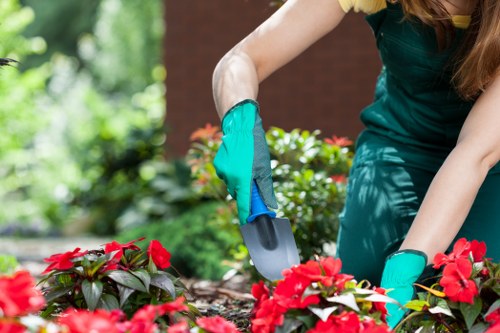
Essential Tools for Garden Maintenance
Having the right tools is essential for effective garden maintenance. Investing in quality equipment can make your gardening tasks easier and more efficient.
Basic Tools Every Gardener Needs
- **Pruning Shears**: For trimming and shaping plants.
- **Garden Fork**: Ideal for turning soil and removing weeds.
- **Watering Can or Hose**: Ensures plants receive adequate water.
- **Gloves**: Protect your hands from thorns and dirt.
- **Wheelbarrow**: Facilitates the transport of soil, plants, and debris.
These tools form the foundation of any garden maintenance routine, enabling you to perform a variety of tasks with ease.
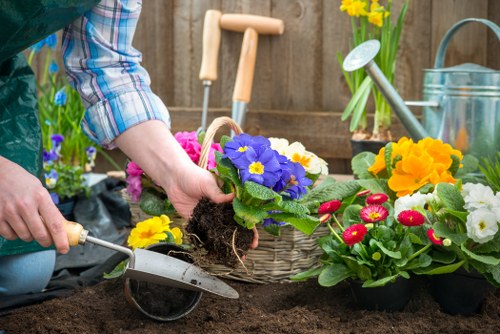
Seasonal Garden Care
Different seasons require different maintenance strategies to keep your garden in top shape. Understanding the seasonal needs will help you plan and execute your gardening activities effectively.
Spring Maintenance
- Planting New Flowers and Vegetables: Spring is the perfect time to introduce new plants to your garden.
- Pruning shrubs and trees to encourage healthy growth.
- Applying fertilizer to replenish the soil nutrients.
By preparing your garden in the spring, you set the stage for a productive and beautiful growing season.
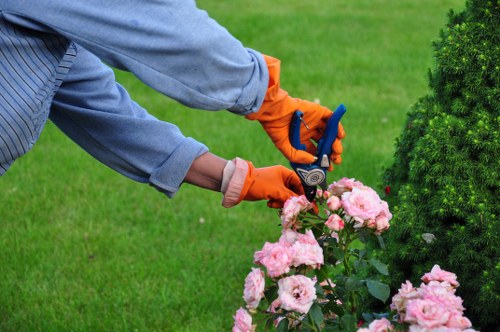
Weed Control and Pest Management
Weeds and pests can quickly disrupt the balance of your garden. Implementing effective control measures is crucial for maintaining plant health and aesthetics.
Organic Weed Control Methods
- Mulching: Suppresses weed growth and retains soil moisture.
- Manual Weeding: Removing weeds by hand to prevent them from spreading.
- Using natural herbicides that are safe for the environment.
Maintaining vigilance against pests ensures that your plants remain healthy and free from diseases.
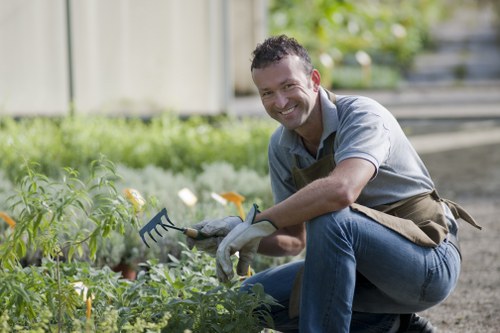
Watering and Irrigation Techniques
Proper watering is vital for garden maintenance, especially in regions like Clapham where weather patterns can vary.
Efficient Irrigation Systems
- **Drip Irrigation**: Delivers water directly to the plant roots, reducing evaporation.
- **Sprinkler Systems**: Suitable for larger gardens, providing even water distribution.
- **Rain Barrels**: Harvest rainwater to use during dry periods.
Implementing efficient irrigation systems not only conserves water but also ensures that your plants receive the right amount of moisture.
Soil Health and Fertilization
Healthy soil is the foundation of a thriving garden. Regularly testing and amending your soil can significantly improve plant growth and resilience.
Soil Testing and Amendments
- Conducting soil tests to determine nutrient levels and pH balance.
- Adding compost to enhance soil structure and fertility.
- Incorporating organic matter to improve drainage and aeration.
By maintaining optimal soil health, you provide your plants with the necessary resources to grow strong and healthy.
Lawn Care and Maintenance
A well-maintained lawn adds curb appeal and provides a pleasant space for outdoor activities. Regular lawn care is an integral part of garden maintenance in Clapham.
Mowing and Trimming
- **Mowing Regularly**: Keeps the grass at the optimal height for growth.
- Edging around pathways and flower beds for a neat appearance.
- Replacing lawn equipment blades to ensure clean cuts.
Proper mowing techniques contribute to a healthy and attractive lawn.
Pruning and Trimming Techniques
Pruning is essential for shaping plants, promoting growth, and preventing diseases. Understanding the right techniques can enhance the overall health of your garden.
Best Practices for Pruning
- **Timing**: Prune at the right time of year for each plant species.
- **Tools**: Use clean and sharp tools to make precise cuts.
- **Technique**: Remove dead or diseased branches to encourage new growth.
Regular pruning ensures that your plants remain healthy and aesthetically pleasing.
Plant Selection and Landscaping
Choosing the right plants is crucial for creating a cohesive and sustainable garden. Consider factors like climate, soil type, and maintenance requirements when selecting plants.
Native Plants and Their Benefits
- **Drought-Resistant Varieties**: Perfect for reducing water usage.
- Low-Maintenance Plants: Require minimal care, ideal for busy gardeners.
- **Biodiversity**: Supporting local wildlife and beneficial insects.
Incorporating native plants can enhance the resilience and beauty of your garden.
Seasonal Planting Schedules
Planning your planting schedule according to the seasons ensures that your garden remains vibrant throughout the year.
Spring and Summer Planting
- **Perennials and Annuals**: Planting colorful flowers that bloom in warmer months.
- Vegetable Gardens: Starting early to maximize harvests.
- **Herbs and Medicinal Plants**: Adding functionality to your garden.
Strategic planting during these seasons leads to a bountiful and attractive garden.
Eco-Friendly Garden Practices
Adopting eco-friendly practices in your garden maintenance routine contributes to environmental sustainability and reduces your carbon footprint.
Composting and Recycling
- **Composting Organic Waste**: Turning kitchen scraps and garden waste into nutrient-rich soil.
- **Recycling Water**: Utilizing greywater systems for irrigation.
- **Sustainable Materials**: Choosing eco-friendly products for garden structures.
Integrating these practices promotes a healthier ecosystem and a more sustainable garden.
Dealing with Common Garden Problems
Every garden faces challenges, from pests to diseases. Identifying and addressing these issues promptly can save your garden from significant damage.
Identifying and Managing Pests
- **Common Pests in Clapham Gardens**: Aphids, slugs, and caterpillars.
- Natural Remedies: Using neem oil and introducing beneficial insects.
- **Preventative Measures**: Keeping the garden clean and removing debris.
Effective pest management ensures that your plants remain healthy and productive.
Mulching for Soil Health
Mulching is a simple yet effective technique for enhancing soil health and conserving moisture in your garden.
Benefits of Mulching
- **Moisture Retention**: Reduces the need for frequent watering.
- Temperature Regulation: Keeps soil cool during hot months.
- **Weed Suppression**: Prevents weed seeds from germinating.
Choosing the right type of mulch can significantly improve the overall health of your soil.
Pruning Techniques for Trees and Shrubs
Proper pruning fosters the growth and longevity of trees and shrubs, contributing to a well-maintained garden.
Tools and Methods for Effective Pruning
- **Pruning Saws and Shears**: Essential for making clean cuts.
- Thinning and Heading Cuts: Techniques to shape plants and remove excess growth.
- **Safety Precautions**: Wearing protective gear and maintaining tools.
Mastering these techniques ensures that your trees and shrubs remain healthy and visually appealing.
Maintaining Garden Paths and Structures
Garden paths, fences, and other structures add functionality and beauty to your outdoor space. Regular maintenance keeps these elements in good condition.
Repair and Upkeep Tips
- **Cleaning and Sealing**: Protecting paths from wear and tear.
- Repairing Damaged Structures: Fixing fences, gates, and garden furniture.
- **Landscaping Enhancements**: Adding lighting and decorative elements.
Maintaining these features enhances the overall appeal and usability of your garden.
Seasonal Clean-Up and Preparation
End-of-season clean-ups prepare your garden for the next planting cycle and prevent the buildup of pests and diseases.
Fall and Winter Maintenance
- **Raking Leaves**: Removing debris to prevent mold and pests.
- Protecting Plants: Covering vulnerable plants during harsh weather.
- **Preparing Soil**: Adding compost and fertilizers for spring growth.
These steps ensure that your garden remains healthy and ready for the upcoming seasons.
Professional Garden Maintenance Services in Clapham
If maintaining your garden becomes overwhelming, consider hiring professional garden maintenance services in Clapham. Experts can provide tailored solutions to meet your garden's specific needs.
Benefits of Hiring Professionals
- **Expert Knowledge**: Access to specialized skills and advice.
- Time-Saving: Free up your schedule by delegating tasks.
- **Customized Care**: Personalized maintenance plans for optimal results.
Investing in professional services ensures that your garden receives the attention it deserves.
Eco-Friendly Practices for Sustainable Gardening
Sustainability is becoming increasingly important in garden maintenance. Adopting eco-friendly practices benefits both your garden and the environment.
Composting and Organic Fertilizers
- **Reducing Waste**: Turning kitchen scraps into valuable compost.
- Natural Fertilizers: Enhancing soil fertility without chemical additives.
- **Soil Amendment**: Improving soil structure with organic matter.
Implementing these practices promotes a healthy and sustainable garden ecosystem.
Conclusion
Maintaining a garden in Clapham is a rewarding endeavor that requires careful planning and consistent effort. By following the guidelines outlined in this guide, you can achieve a beautiful and sustainable garden that enhances your outdoor living space.
Whether you choose to handle the maintenance yourself or enlist the help of professionals, the key is to stay informed and proactive in your gardening practices.
Contact us today to learn more about our garden maintenance services and transform your garden into a thriving haven.

